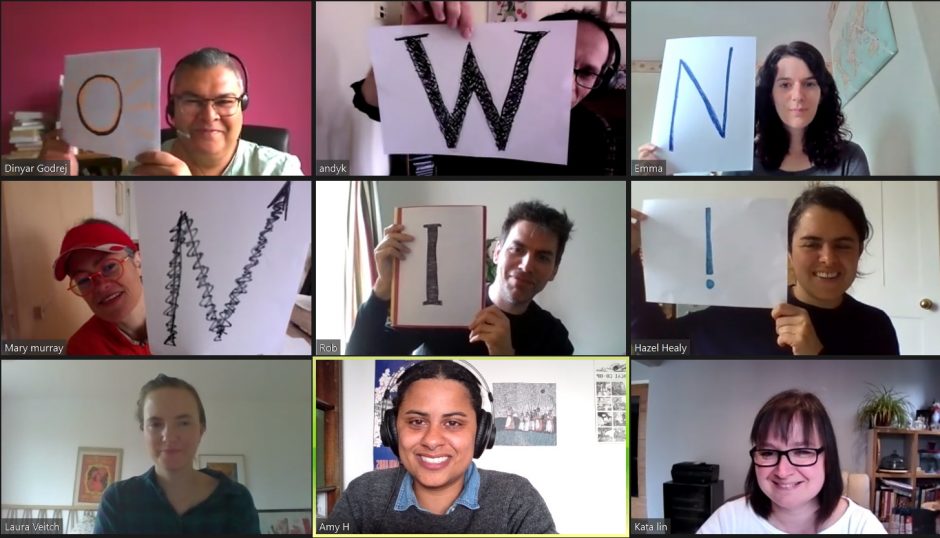It has been a difficult year for magazine publishers, including the New Internationalist, which launched a community share offer in May, asking supporters and readers around the world to fund the magazine’s post Covid-19 recovery.
A third of new magazine subscriptions would normally come through face-to-face interactions at conferences, events and festivals, all of which were cancelled due to Covid-19. The funding raised via the share offer will be used to strengthen its campaigning journalism, reinvent the way its bi-monthly magazine is being sold and distributed and increase subscription levels.
“It’s just going to take us quite a long time to recover from this. I think we’ll be feeling the impact for several years just because of the nature of being a subscription based publication,” said co-editor Amy Hall, who joined full time in 2019 but had been working for the magazine in the past as a freelancer.
Unlike most other publications, the New Internationalist does not have a hierarchy. Since 1987 it has operated an equal pay policy, meaning that all staff members get paid the same regardless of how long they have been with the organisation.

“I really like working as part of a co-operative, and it’s different,” said Ms Hall. “In a lot of ways it’s he same as in any other publication, you still have to meet your deadlines and you know you do interviews and you write your articles and the job is the same in a lot of ways, and it’s more about how things work.
“Unlike any other magazines, where you might have an editor and deputy editor and a hierarchy, we work quite differently in that we have co-editors so we’re all on the same level, no matter like how long we’ve been there for. So we have to make decisions together and it’s a really collaborative way of working. When we have ideas we talk through them together, we discuss the themes that we’re going to cover.
“The rest of the co-operative and also our readers have quite a lot of involvement in deciding what we cover as well, so it’s quite different to working in a different types of organisation or a different type of publication.”
In addition to the share offer, the New Internationalist has developed a three-year investment strategy, which will enable it to plan for the gap caused by the impact of the pandemic, but also build its customer base and help make sure that the whole organisation is more sustainable. Some of the funding will be allocated to investing in the New Internationalist’s online ethical shop. A target of £350,000 pounds has been set in order to put that whole plan into action, two thirds of which has already been raised.
“We think we have like an excellent product and we want to sell it better,” added Ms Hall. The co-op is trying to bring the management of its subscriptions in house instead of using an external company and wants to build out audiences outside of the UK. It also aims to increase the magazine subscriptions by 4,500 in the next three years, which, says Ms Hall will enable the co-op to be self-sustainable. Before Covid-19 hit print magazine subscription numbers were going up for the first time in a decade, following a redesign of the magazine in 2018.

The New Internationalist went from being a worker co-op to a multi-stakeholder co-op in 2017, which enabled supporters of the magazine to become members. Its current reader owners include 3,600 readers in 42 countries. They can vote on the New Internationalist’s charter and stand for election to its common council and the society’s board of directors. In doing so they also helped to shape the co-op’s ethical procurement and advertising policies.
“This means that we can’t deviate from our founding principles without the agreement of our co-owners, and any change to our mission or charter would need 75% of them to agree to it.”
Since being set up almost 48 years ago, the New Internationalist has covered a range of social and environmental issues, as well as global issues such as the Vietnam War or the armed conflict during the decolonisation of Africa.
“The Internationalist has been around since before I was born. So, it’s fascinating to go through the archives. The New Internationalist has been covering big issues like climate change, LGBT rights, and racism for decades and often way ahead of its time.
“We’re also really big on solutions focused journalism and trying to look at alternatives and the different ways of doing things, which again is something that our readers really appreciate.”
In a recent survey 97% of New Internationalist readers said they had increased their awareness of global inequality, and more than two thirds said they had done something different, directly as a result of what they’d read in the New Internationalist.
Could co-operative ownership be a solution to the media crisis? While different publications will require different solutions, Ms Hall thinks the co-operative ownership model “has a lot to offer”.
“It’s just such a good antidote to the increasing consolidation of ownership that you see in the rest of the media. People become co-owners and although they’re not really involved in the day-to-day running of the business, they really do feel part of it,” she said.
As to the future, Ms Hall says the New Internationalist sees its print publication as key to its work and has no plans to go fully digital.
“I think a lot of people now just really appreciate having something they can hold in their hand that they don’t have to look at a screen for and also that they can give to other people so, because a lot of the things that we cover, the issues are really important, and people just hold on to them and pass them around to people or kind of go back to them for reference, and also since the redesign is just so beautiful like it’s just a really nice thing to look at and hold in your hand so I think for now we have no plans to go completely digital. The print product is always what people have wanted from us, and what seems to go well,” she added.
For now, the New Internationalist is encouraging supporters to become member owners by investing in its share offer to secure the publication’s future as it gets closer to its 50th anniversary in 2023.